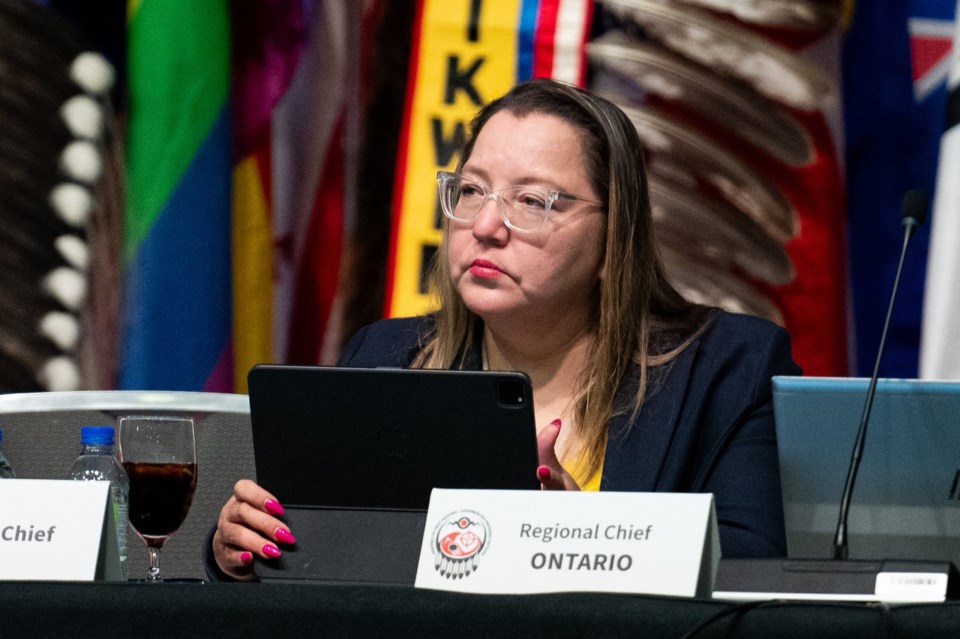OTTAWA — Parliamentarians will be "playing games with First Nations children's lives" if they fail to quickly introduce and pass legislation to ensure access to clean drinking water, the Assembly of First Nations national chief said Monday.
The Liberals under then-prime minister Justin Trudeau introduced legislation that would have guaranteed the right to clean drinking water — but it failed to become law before Parliament was prorogued and an election was called.
"Every member of Parliament in Canada that's going to sit in that House has an obligation to think about all the children of this country, and shame on people that played games, pushing it down politically, kicking it to each other and blaming each other, even through the election," National Chief Cindy Woodhouse Nepinak told a news conference Monday.
"You all had an obligation. You all had the chance to support that."
Following a lengthy study of the bill in a committee, and during an ongoing debate that gridlocked the government for months, the Liberals attempted to send it to the Senate through a unanimous consent motion but it was struck down by the Conservatives.
The Conservatives then introduced the same motion but added language that condemned the actions of the Liberals on the file. That motion was also struck down and the bill then died on the order paper when Trudeau prorogued the government in January.
Prime Minister Mark Carney has indicated his government will reintroduce the legislation, known in the last Parliament as Bill C-61, after speaking with Indigenous communities. Woodhouse Nepinak said she'll hold him to that promise.
The national chief made her comments Monday alongside other First Nations leaders who were outlining their expectations for the first 100 days of the new government.
They said First Nations must have a seat at the table as Canada works to expand the economy in the midst of trade friction with the United States, and as some voters in Western Canada flirt with a sovereignty movement.
"Over $560 billion of projects are forecasted on our traditional lands over the next decade. The potential benefits are measured in the trillions of dollars," Woodhouse Nepinak said.
"But they won't advance without First Nations' support."
In response to Alberta Premier Danielle Smith introducing a bill that would make it easier for Albertans to launch referendums on various topics — including separating from Canada — Woodhouse Nepinak said the federal government should initiate a constitutional review of the Natural Resources Transfer Agreement signed in 1930.
She said that agreement violates treaties and protections for Indigenous Peoples that are now included in the Constitution but were not taken into consideration when the federal government was negotiating with the three Prairie provinces. She said the "unilateral" imposition of that agreement undermines those rights and treaties.
"Now is the time to demonstrate to the world that we can win by being inclusive, respecting rights and treaties," Woodhouse Nepinak said.
Chief Gerald Toney of Annapolis Valley First Nation said he wants to see changes to the way Fisheries and Oceans Canada operates in his territory. He called on the government to honour its commitment to review an incident from early last year, when two Mik'maw fisherman were detained and released far from their homes in freezing temperatures without adequate clothing or their cellphones.
Trudeau also promised his government would bring forward a new First Nations policing law in 2020 after years of calls from Indigenous leaders. The bill never materialized, despite ministers saying publicly on multiple occasions it would be tabled imminently.
Woodhouse Nepinak said chiefs are united in their call to move that legislation forward and on reforming the "racist" child welfare system.
Carney has said he'll put back on the table a $47.8 billion deal to reform the First Nations child welfare system — a deal chiefs voted down on two occasions following a decades-long court battle that found Canada was discriminating against First Nations children.
The national chief also pointed to the growing infrastructure gap in Indigenous communities — which the AFN estimates will cost $350 billion to fix and which Trudeau pledged to address by 2030. Current levels of investment are sure to push that deadline farther in the future.
"In order to propel this country to be a number 1 G7 country, it needs to invest in First Nations people," Woodhouse Nepinak said.
"We can't drop the ball on that."
This report by The Canadian Press was first published May 12, 2025.
Alessia Passafiume, The Canadian Press



